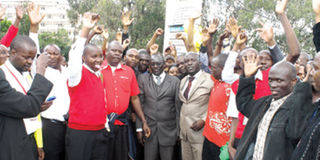KQ staff win back their jobs

PHOTO | PAUL WAWERU Kenya Airways employees celebrate on December 3, 2012 after the industrial court ruled that they were retrenched unfairly and they should return to work. In the centre is their lawyer Okweh Achiando.
What you need to know:
- “Under section 43 and 45 of the Employment Act 2007, the employer must establish valid reasons for termination and demonstrate that it followed fair procedure,” Industrial Court Judge James Rika ruled
- In his ruling, the judge said that alternative avenues were not considered, adding that even when the government, through the office of the Prime Minister, called for further consultations, the advice was ignored by the management
- The judge pointed out that Kenya Airways is merely using a financial downturn to justify its replacement of unionisable employees with outsourced and foreign workers
Kenya Airways has been ordered by a court to reemploy more than 500 workers sacked in September under a cost cutting measures on grounds that their dismissal was unfairly done.
In a ruling delivered on Monday, Industrial Court Judge James Rika ordered the 545 workers to report to work today at 8 am.
The judge noted that the national carrier did not follow procedure and did not consult while conducting the retrenchment.
In retrenching, Kenya Airways noted that the move would save it more than Sh1 billion annually in cost cutting measures.
The airline which recently reported Sh4.7 billion loss for the first half of its financial year ending September 2012, will now face a new dilemma on how to deal with the court ruling and keep tap on the cost.
“Under section 43 and 45 of the Employment Act 2007, the employer must establish valid reasons for termination and demonstrate that it followed fair procedure,” Justice Rika ruled.
In a statement sent to media houses after the ruling the Kenya Airways management noted that their lawyers were studying the ruling and its implications.
Advice ignored
“We shall advise on the next steps in due course,” the statement signed by Managing Director Titus Naikuni read in part.
In his ruling, the judge said that alternative avenues were not considered, adding that even when the government, through the office of the Prime Minister, called for further consultations, the advice was ignored by the management.
The government is the largest shareholder in Kenya Airways.
He said that Kenya Airways is faced with a cyclic economic downturn, not a downfall, adding that not every cyclic financial report of loss should be read as valid reason to justify retrenchment.
“Many companies make cyclic losses and do not rush to retrench. The court would not have exercised its mind judiciously, if it concluded that simply because an employer has come to court with evidence of record of financial loss, its decision to mass terminate the contracts of its employees is substantively justifiable,” said Mr Justice Rika.
The judge pointed out that Kenya Airways is merely using a financial downturn to justify its replacement of unionisable employees with outsourced and foreign workers. (Read: Firms opt for layoffs as effects of economic slowdown emerge)
He said a company that is expanding as had earlier been indicated by Mr Naikuni, would require more but, not fewer employees.
The court also found that no jobs had been redesigned or collapsed as a result of genuine restructuring since Kenya Airways has been recruiting more employees through an outsourcing firm, Career Directions.
The judge said that Kenya Airways should not have gone ahead with the restructuring process, stopping the salaries and locking out employees, after the court froze the entire process.
Equally, the judge said that the court had considered that a majority of Kenya Airways employees who were sacked — flight operations and ground service employees — was not likely to fit elsewhere in the Kenyan job market, because there are no comparable jobs.
He ordered that all the unionisable employees should be reinstated to their roles at Kenya Airways, which they held prior to their sacking, without loss of seniority, continuity, benefit and privileges adding that all employees shall be paid their back-salaries and allowances from the month of September.




